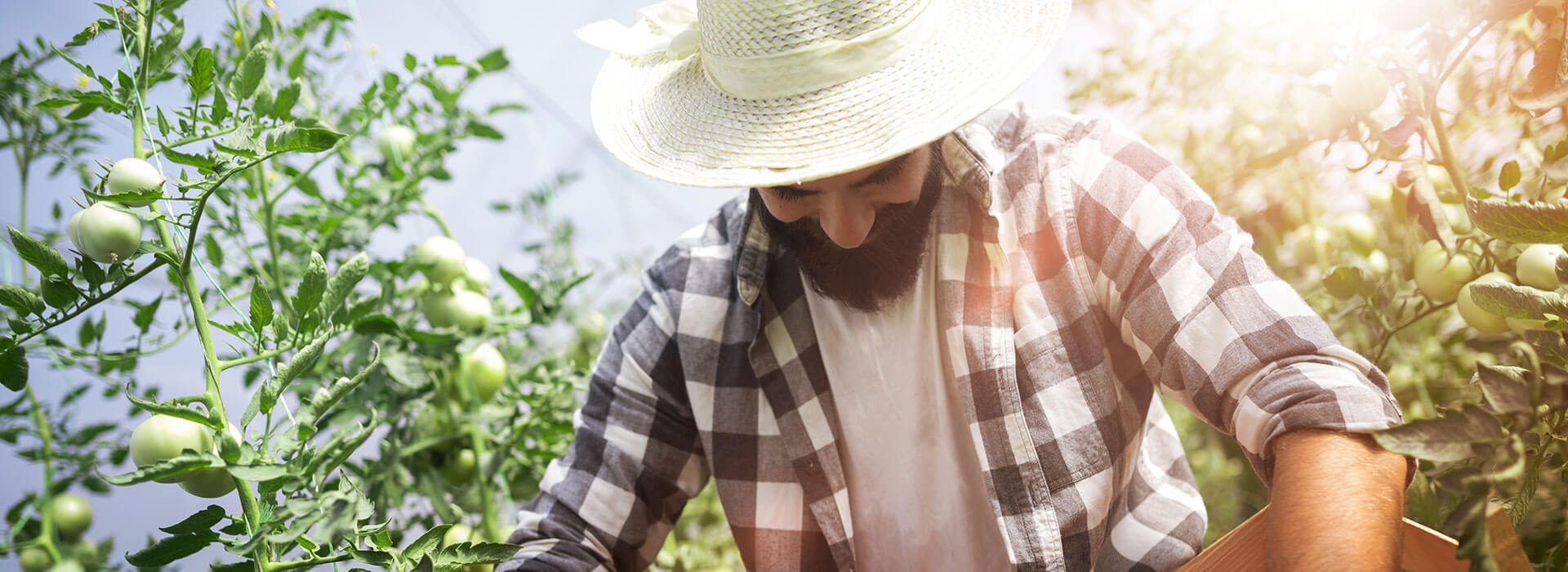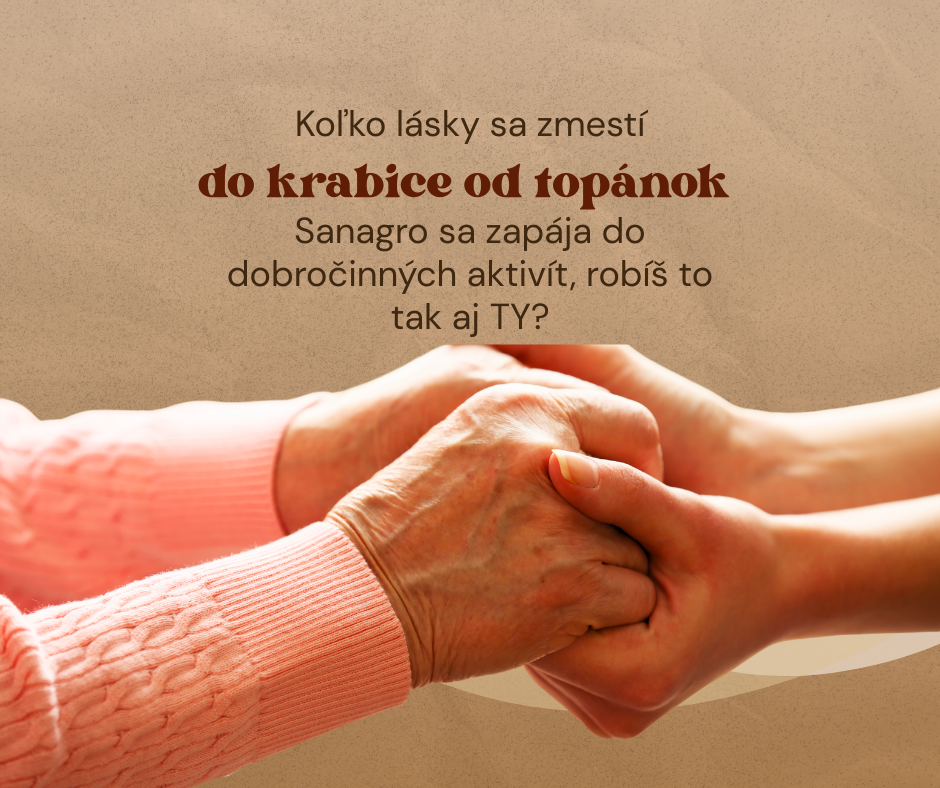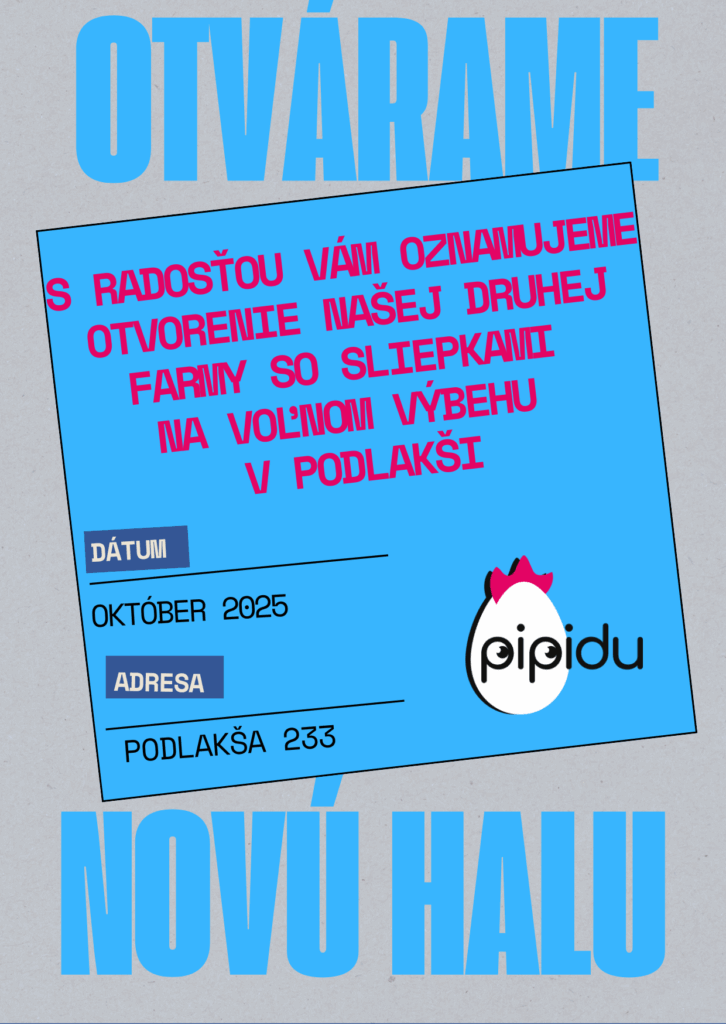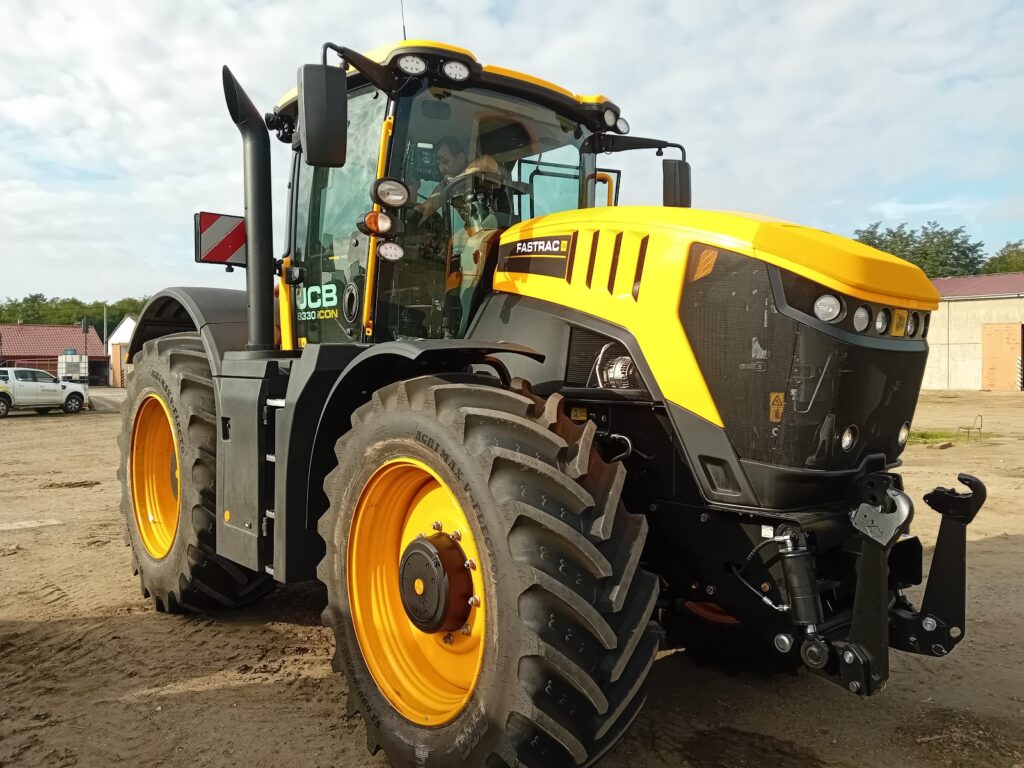Farmers should not be divided into small and big, but honest and dishonest, says Tomáš Kohút, CEO of the Sanagro agricultural group, in an interview with TREND.

He denies that they exploit small shareholders in the farms they take over. According to him, this is evidenced by healthy cooperatives and happy employees. The group, backed by Sandberg Capital, is one of the five largest agribusinesses in the country. Sanagro manages eleven farms in western and central Slovakia. It manages about 21 thousand hectares, of which about 15 thousand are arable land.
Do you still grow mainly cereals and oilseeds?
Yeah. But we are also starting to diversify into other crops. Increasing food self-sufficiency is a very popular topic at the moment, but it is utopian to think that we are going to grow vegetables on a million hectares. According to the SPPK, in order for Slovakia to be self-sufficient in vegetables, it is enough to grow them on roughly 15 thousand hectares. Even if it were grown by farmers, who would probably not have all of it under irrigation, we can therefore think that it will be grown on 30 000 hectares of land. And if we take into account that there are 1.5 million hectares of arable land in our territory, then there is the question of what we are going to grow on the remaining 1.47 million hectares. On those, then, we need to grow other crops. Even if we grew vegetables on 100 000 hectares, that would mean that we would have to export them. But with that support per hectare, it will not be competitive abroad.
And so, the only ones who will be happy will be the domestic food chains, because there will be such a huge glut of Slovak vegetables that the price will go down and the scenario from when we joined the European Union will very likely repeat itself. Vegetable growers will simply go bankrupt because it is not worth their while to even go into the field.
What other crops do you want to grow?
We planted the first 30 hectares of onions in Senica, and we are thinking about growing eco-farms in Huški, where we have the largest eco-farm in Slovakia. We also want to go back to growing potatoes in Turiec, because it was historically a potato-growing area. We just need to calculate the return and weigh up the risks, because it is a high initial investment of EUR 600 000.
Didn't this year's drought hit cereals and rape the hardest?
In principle, it affects all crops. Larger growers have their vegetables under irrigation, so they do not suffer as much. However, the damage we are seeing today is mainly due to the frosts. We have experienced extremes of relatively warm and dry during the day and freezing at night. In Turkey, for example, it was minus two degrees Celsius at night until two weeks ago.
Plants got a beating, especially the spring ones. The winter plants were in relatively good shape. And in May it really rained at one minute to twelve. Now it rains at least once a week, that helps the plants quite a bit. Especially the spring plants, where the damage would have been irreversible if the drought had continued.
In some regions we have already seen this happen, fortunately not on very large areas. Roughly 80 hectares of rape in Leopoldov are irreparably damaged. But elsewhere, those crops are thriving. We shall see if they can make up time.
Last year in May it looked promising after a dry spring and then came the hot summer...
Just three weeks before the harvest we predicted the highest yield per hectare ever and then it turned out catastrophically for most of Slovakia. And although the volumes were met, the quality parameters were not met and the whole country had a problem with that. So even now, although it looks much better, we are very cautious.
Extreme droughts have become the norm. However, the state of irrigation is poor. How much of your acreage can you irrigate, and is it even worth it for cereals or oilseeds?
We can currently irrigate one hundred hectares. Out of 14 thousand. But it is utopian to think that we can irrigate a million and a half hectares of official arable land in Slovakia. We would probably pull out all the reservoirs and rivers. And then pray that it would fall back in rainfall. That is not realistic.
For this reason, only special crops can be irrigated - vegetables, sugar beet, seed corn. For example, last year when we thought about expanding irrigation on two hundred hectares on the Food Farm near Hlohovec, it cost us an investment of 357 thousand euros. Even if we were to go ahead with this, we are once again faced with the problem of water, which is already scarce.
The state is supporting the revitalisation of old drainage channels, so far to the tune of 30 million euros. The call has been criticised by experts and farmers, such as the vegetable farmer Juraj Mačaj, because they are to be restored even where there is no water anymore. How do you see this project?
J. I consider Mačaj to be a great expert in vegetable growing and his criticism is justified. We ourselves are witnessing decisions made by state authorities which, from our point of view, are made as if from the table without inviting people from practice.
These actions are as damaging to Slovak farmers as the statements about bad big agribusinesses, but nobody gives the big groups, which are big especially in terms of employing a large number of workers, any space to express themselves. Or like the affair with the attempt to divert EUR 45 million from direct payments into the second pillar of the common agricultural policy. These decisions are made 'about us without us', and if it had not leaked out, Bratislava would probably be blocked again today by angry farmers.
Was it really such a problem that it would threaten Sanagro as well?
We have already lost EUR 600 thousand in subsidies. This was offset to some extent by support for green diesel, which, however, according to the former government, was supposed to be further aid for Slovak farmers, not compensation. However, we still lost perhaps EUR 250 thousand. If someone wants to take hundreds of thousands of euros more from not only us, but from all farmers, and still expects us to help build the food self-sufficiency of Slovakia. That is unacceptable, and any farmer will tell you that.
State subsidies are already very low compared to other European countries. Slovakia has the sixth lowest direct payment per hectare. It works out at about EUR 200. State aid is at the level of five euros per hectare. We are fourth from the bottom in terms of total spending on agriculture in the EU. If someone wants to take away from what little we have because, according to someone, we want to make a profit out of it, it is a person who is completely ignorant of what it is like in reality.
Try taking 20 percent of the profits of a car company or an iron and steel company. But farmers cannot pack up and go elsewhere. But the factories can. And the crisis, which has temporarily closed the borders, has shown us that what we consider to be a marginal sector is becoming a strategic one. We are really talking about the country's ability to survive.
As late as mid-May, it was unclear whether machinery and its operators from abroad would be able to come to the harvest because of the quarantine. At present, crossing the borders with the Czech Republic and Hungary is unrestricted. So has the problem of missing harvesters and workers been resolved ?
For now, it certainly does. I'm hoping in the corner of my soul that we're dealing with something that won't even need to be dealt with. It's just that at the time we brought this subject up, there were predictions of 500 thousand sick people, nobody knew what we were getting into. We were pointing out that if the harvesters from abroad could not come to us and there was no one to do the harvesting, we could have a real problem with food in the autumn and next year.
You are also a primary milk producer. You missed people because of the coronary crisis, as many women had to be at home with their children. How did you cope with the situation and what is it like now?
There is a long-term shortage of workers in livestock production. The situation has been better for a while now, people are reporting themselves, because a lot of plants have closed down and a lot of people who go abroad for seasonal work have stayed at home. But I don't foresee that this will be the case in the long term. Within a maximum of two years, it will all go back to the way it was. Given the prices at which milk is traded, you cannot pay a milkmaid EUR 1 500. So we are at the stage where we are increasingly thinking about automation.
The near future lies mainly in workers from abroad. Just as Slovaks come to work in the UK and Germany, Ukrainians are coming to us today. There is already talk of workers from Uzbekistan and Kazakhstan. Their main advantage is not that they are cheaper, but that they are relatively stable, want to work and know what livestock production is all about.
The agricultural and food authorities have complained that the new leadership of the ministry is not communicating with them. The ministry said that farmers can submit their comments when the new Rural Development Plan for 2020-2027 is being drawn up.
Having someone send me an email address where I can send comments is not a solution and I do not consider it to be an appropriate way of setting up the agri-sector concept. Unless we all sit down at an imaginary round table, the primary producers, the processors, the retail chains and also the ministry, and talk, we are not going to get anywhere.
We are already in the middle of 2020 and nobody knows how it will be. I cannot make any systemic decision. For example, if I invest EUR 1.5 million in a new barn, I do not know whether that will be the right decision, because, so far, all the indications are that cattle will not be supported.
At the end of June, you usually publish the financial statements. In 2018, Sanagro ended with a profit of over EUR 1.2 million. How was 2019 for the Group?
Due to the drought and vole damage, we achieved roughly one million euros less revenue than planned. We are trying to take consolidation measures, but there are two things we cannot control. Subsidy policy and the weather.
Was that the reason why you did not buy the agricultural part of Esin group?After this investment you would have doubled your size and you would have expanded your agribusiness business to eastern Slovakia as well.
No, it was not essential to our decision. There really was a different view of working capital in relation to the purchase price.

Esin's reputation was damaged by a dispute with farmer František Oravec and now by the arrest of its partner Vlastimil Majerčák on suspicion of bribery. Denník N came with the information that the whole Esin, except for the disputed part, was taken over by KPRHT 4, i.e. the company of Andrea Tkáčová - the sister of Patrik Tkáč. J&T has invested in the Sandberg Capital fund, which owns Sanagro. Isn't this deal just a temporary cover-up and Sanagro will later take over the original Esina farms from the Tkács anyway?
That is certainly not the aim, I can swear to that. Whether it will not end up that way in the end, I cannot rule out, nor do I want to. That is the future. But that certainly wasn't the reason we didn't buy it. We invested a relatively large amount of money and time in that transaction, but it ultimately failed really on different views of the value of working capital. For us, it was already beyond what we were willing to pay.
Of course I perceive that the reputation is not the best. Although from my point of view it is the "small farmer" who is abusing his position. I know there was an effort on Esin's part to cut a deal. Today it has perhaps gotten to some personal level.
The dispute with F. Oravec was already there when we announced that we were going to merge. We had already evaluated the impact on our name. We are not so concerned with the history or reputation of companies when investing. Sanagro has built a good reputation in the sector and we want to continue to be a guarantor that when we enter a farm with disputes, we will be there as a mediator, everything will be done in a lawful way and nobody will be wronged. The entry of large groups into Slovak cooperatives is a sorry topic and is unfortunately presented in such a way that the big ones want to oppress the small ones, but it is not so. Sometimes it is even just the opposite.
Negotiations for the purchase of Esin's agricultural division were admittedly tough, but exceedingly fair, so I certainly will not categorically deny that a merger with Esin could ever have taken place, but I deny that it was a planned cover-up manoeuvre.
Sanagro also has a reputation problem. The dispute over the AFG agricultural cooperative, where you are the biggest creditor, is well known. Hospodárske noviny reported that Sanagro, through its daughter, is pulling assets out of the cooperative despite a court order. Critics liken this to the practices of the 1990s and the squeezing out of small shareholders ...
Everything we are doing is aimed at rescuing AFG, which was extremely indebted and had zero market value. At the time we bought the debt from the leasing company, AFG did not have enough revenue to pay its obligations. They didn't have the money to put diesel in the machines or change the tires.
On several occasions we have Mrs. A. Brody (Anna Brody is a minority owner of the AFG cooperative, who is suing for allegedly illegally squeezing her share - TREND's note) was invited to a meeting, and although she agreed, she did not come. She kept changing legal offices, her lawyer filed an urgent injunction in a court with no local jurisdiction, and the judge, even though she was obliged to lift the injunction, did not do so. If Mrs A. Bródy was willing to talk to us and come to an agreement, we would not have had to take steps which, although they may not be popular in public, are legal and important in terms of protecting our society. We do not have confidence that if we were to enter and manage the AFG directly, that skeletons of a similar nature to the Kocner promissory notes would not start jumping out of the closet at us.
We no longer believe that we can come to an agreement with Ms. Brody. We are taking all the steps we are taking in agreement with our lawyers, in accordance with the legislation. We are not robbing anyone of money, we are not tunnelling the company in any way, we want to turn it around. We are just trying to protect all our claims. So we just want to make sure that we don't come out of this damaged.
How important is it for you to expand? Does the principle that the more farms you have, the more worthwhile it is to do it work?
I wouldn't argue that it's just about size. It is an advantage if you have farms in different regions, because the impact of drought is not the same either. But it does not make sense to buy them at any price. Either it has to be a well-run machine that will generate a regular profit, or it is a farm that has potential and we can improve it. But I cannot say today where the ceiling is. Whether we will stay at our current size or whether the ceiling will be 30 000 or 50 000 hectares. Simply, where there is an opportunity and where we can get people to run it, that is where we will consider it.
The Tkáčov family about the purchase of Esin
The main reason for the purchase is to protect the claims against Esin Group held by the companies co-owned by the family. The activities of František Oravec have destroyed a substantial part of the Esin Group's business and put it in a crisis situation. The J&T Group and other companies co-owned by the Tkáčov family are its major creditors. After negotiations between the owners of the company and the creditors, the best solution, which all of them perceived as sufficient protection of their claims, turned out to be the sale of the entire Esin group to the Tkáčov family (Jozef, Patrik, Andrea). This is a better solution for the selling party because it is comprehensive. With the Sanagro group they negotiated only the sale of the agro activities. Negotiations got stuck on a different view of the price.
Opinion of Esin
We announced our intention to exit the agribusiness and the first steps to sell our agricultural arm at the end of last year. We have been negotiating with the Sanagro Group to divest only the agricultural arm. However, we did not meet in the working capital assessment.
At that time, there was an opportunity to divest the entire Esin group. We considered this to be a more comprehensive and therefore better solution for us. Therefore, we toned down the negotiations with Sanagro and continued negotiations with the Tkáčov family. We do not know what the plans of the Tkáčov family are after the sale. However, we can clearly say from the way the negotiations were conducted that there was no cover-up manoeuvre.






